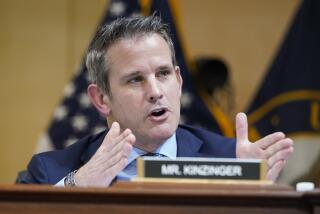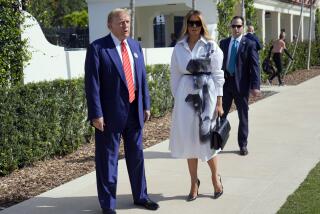Campaign’s Richest Delegate Prize : Gloves Come Off as Super Tuesday Showdown Nears
- Share via
DALLAS — “Tonight was the beginning of the main event of 1988,” said Tennessee Sen. Albert Gore Jr. “I think it’s fair to lay it on the line.”
Thus Gore explained why he saw fit to rip his Democratic presidential rivals up one side and down the other during the television debate here last week that kicked off the drive for the richest delegate prize of the campaign--the March 8 Super Tuesday primaries.
The environment was just as belligerent on the Republican side, a point driven home by a key aide to Kansas Sen. Bob Dole, chief rival to Vice President George Bush for the GOP nomination.
“We have to go South and kick the living hell out of George Bush,” said David Keene, Dole’s senior political consultant.
As these remarks make abundantly clear, any traces of gentility are rapidly vanishing from the struggle for the White House as the Super Tuesday showdown approaches. With more than 30% of the delegates to each party’s convention at stake, all the contenders are turning up the heat, aggressively building up their own claims to voter support and, often, even more aggressively putting down the pretensions of their opponents.
The underlying reason is that the March 8 stakes are enormous for every candidate. For some the outcome could mean something close to certain victory--or certain defeat.
The aspirant with the greatest potential here is probably Bush. With his superior financial and organizational resources, Bush could all but assure his nomination with a decisive victory on March 8.
At the other end of the spectrum are New York Rep. Jack Kemp, who is hanging on to his candidacy by a thread, and the contentious Gore, who has chosen to rest the future of his campaign on a strong Southern showing. A Super Tuesday flop would make their candidacies close to irrelevant should they chose to compete in future primaries.
That explains why Gore pounded away at his two chief white rivals for Southern support in last week’s debate here, accusing Massachusetts Gov. Michael S. Dukakis of weakness in dealing with Communist intrusions in this hemisphere, and indicting Missouri Rep. Richard A. Gephardt for political expediency.
And it explains why Kemp, given a rare opportunity to debate Bush one-on-one here last week, once again castigated the vice president for remarking in New Hampshire: “Give peace a chance.”
Said Kemp: “You have yet to mention how important it is that this country stand for something beyond just peace.”
Spontaneous Outbursts
Of course, not all the outbursts heard along the campaign trail are necessarily so well-calculated. Some appear to have resulted from the frayed condition of candidates after prolonged months of exhaustion and frustration. This sort of response was exemplified most dramatically on the night of Dole’s defeat in New Hampshire by the Kansan’s harsh admonition to Bush over national television to “stop lying about my record.”
That inevitably focused press and public attention on the subject Dole’s advisers have tried hardest to have people forget--Dole’s celebrated nasty streak. And when reporters pressed Dole about his testiness, this naturally made him even testier. Asked about his crotchetiness, Dole reportedly retorted: “I’ve got a bad cold. Maybe you’ll get one, one day.”
But far more important than moodiness in shaping campaign rhetoric are the daunting dimensions of the Super Tuesday competition.
A few figures indicate what the candidates are up against. Setting aside the handful of Northern and Western states that will also ballot on March 8, in Dixie alone, where most candidate effort will be concentrated, the battlefield sprawls across 14 Southern and Border states, 50 media markets and 94 congressional districts, holding no fewer than 90 million Americans--40% of the nation’s population.
So broad and heterogeneous is the terrain that a candidate’s only hope for success is to aim at specific geographic and demographic targets. That makes it imperative for each candidate to set himself apart from his rivals by sharpening his own message and, at least as important, by lashing out at his competitors.
Time to Cash In
Now is the time when the candidates must strive to cash in on arguments they labored to develop, frequently at political cost, in the New Hampshire and Iowa campaigns.
“Our strategy is pretty clear,” said Ed Reilly, pollster for Gephardt, who is viewed as one of the leaders of the Democratic pack after his victory in Iowa and his second-place finish in New Hampshire. “We basically have defined a message and a set of ideas. Now we are going to focus on places where we believe we can get the greatest result for our time and dollars.”
One of the keys to Gephardt’s Super Tuesday hopes is his longtime advocacy of an oil import fee, a proposal that is considered to have strong appeal in energy-producing states such as Texas, Oklahoma, Arkansas and Louisiana.
“We took the heat on that issue in New Hampshire,” Reilly said, where anything that might add to fuel costs is politically unpopular. But here in Texas, Gephardt was quick to remind Gore during last week’s debate that Gore had voted against the Gephardt proposal in the past, though now he claimed to support it.
No one is more adroit at using issue positions as solutions for particular political problems than former religious broadcaster Pat Robertson. In his own phrase he has “thrown down the gauntlet” to Bush in the South Carolina primary, which because it takes place on March 5, three days before Super Tuesday, is expected to have a great psychological impact on the subsequent balloting in the rest of the South.
Pulled Out of Debate
Mindful that if he is to defeat Bush in South Carolina, he must beat back the challenge of Kemp for conservative support in that state, Robertson deftly moved to isolate Kemp from his potential backers on the right when he pulled out of the Dallas debate that Dole also snubbed.
In explaining his absence, Robertson labeled Kemp a “stalking horse” for Bush and claimed the two had a secret pact to deny Robertson the presidential nomination.
As a reward for his collusion with Bush, a figure still mistrusted by many conservatives as a moderate, Robertson claimed that Kemp would be Bush’s vice presidential running mate if Bush became the party’s standard-bearer.
Here is a look at the strategies and messages of the other candidates:
DEMOCRATS
--Dukakis. His main targets in the South are the traditional white liberals, many of them upper middle class and white collar, living in urban enclaves in Florida, Georgia and North Carolina. They make up only about 20% of the Democratic primary electorate, but Dukakis strategists are said to believe that combining their Southern liberal support with anticipated victories that day in Massachusetts and Rhode Island will allow them to claim a respectable showing.
But Dukakis’ energy proposals--abandoning the windfall profits tax and providing tax incentives to oil producers and natural gas producers--may sound too business-oriented to please some liberals. Otherwise, Dukakis’ message is highly personal. “Michael Dukakis is best equipped by virtue of his experience and values to govern the country,” said his operations director, Jack Corrigan.
--Gore. As the sole white Southerner in the Super Tuesday contest Gore must contend with Gephardt for the moderates and conservatives who make up about 60% of the Democratic primary vote. Lacking any positive evidence of his appeal in non-Southern states, Gore has so far accentuated the negative, bashing Gephardt, and Dukakis too, for good measure.
He probably can hurt them with his attacks, but he may also hurt himself. Gephardt’s man Reilly already calls Gore “the Democratic Bob Dole.”
Kathleen Jamieson, University of Texas specialist in political communication, said Gore’s pitch for a strong defense is “beautifully tailored” for the South but added that the senator needs more ideas on other issues to gain needed credibility.
--The Rev. Jesse Jackson. He seems to have the simplest task of any of the Democrats--appealing to the blacks who make up about 20% of the Democrat vote around the South, substantially higher in some Deep South states. Increasingly he has sought to depict himself as the champion of underclass voters, white as well as black, and as “an authentic Southerner.”
If he gets working-class whites he will draw support from Gephardt; any middle-class whites will probably come from the Dukakis column. White votes are important to Jackson, not just to help his delegate count in the South, but as evidence of his credibility as a candidate to black voters in future primary battlegrounds.
--Illinois Sen. Paul Simon. Simon has been unable to campaign intensively in the South because he is concentrating on the delegate contests Tuesday in Minnesota and South Dakota.
--Former Colorado Sen. Gary Hart. Hart is not expected to have a significant impact on the Democratic race because of his poor showings in Iowa and New Hampshire.
REPUBLICANS
--Bush. Working for Bush in this region are the great popularity of his political patron, President Reagan, and his long-cultivated ties to the Republican political Establishment. “Bush is in a position to win this thing big,” said Alabama GOP activist Marty Connors. “All he needs to do is clearly articulate where he wants to take America beyond what Ronald Reagan has done.”
But for the ever-cautious vice president that would be a big threshold to cross. It is far more likely that he will stress his own resume and continue to hammer at Dole as a potential big taxer. According to aides, conservative Republican Bush will try to bolster his appeal in the energy-producing South with proposals that seem strikingly similar to ostensibly liberal Democrat Dukakis’ energy plan--scrapping the windfall profits tax and creating new tax breaks for the energy companies.
--Dole. He is expected to strike hard at Bush. “We have to separate him from Reagan,” said consultant Keene, by arguing among other things that Bush lacks enthusiasm for the centerpiece of Reagan’s national security strategy, the Strategic Defense Initiative.
GOP consultant Eddie Mahe, unaffiliated with any candidate, believes Dole can do well in economically hard-hit parts of the South such as Oklahoma, Arkansas and West Texas, a region that Mahe says “is a lot closer to Kansas than it is to Houston.”
The case against Bush, though, seems easier to make than the case for Dole. What Dole has yet to do, as Keene and others acknowledge, “is give people a good reason to vote for him.”
--Kemp. Potentially at least Kemp could draw conservative votes away from Bush and Robertson in the South, his strategists believe. But to have a chance to do that, they have concluded he must finish no worse than second in South Carolina on March 5.
More to Read
Get the L.A. Times Politics newsletter
Deeply reported insights into legislation, politics and policy from Sacramento, Washington and beyond. In your inbox twice per week.
You may occasionally receive promotional content from the Los Angeles Times.










